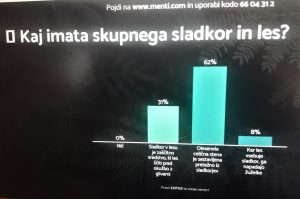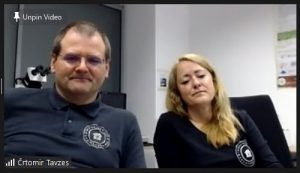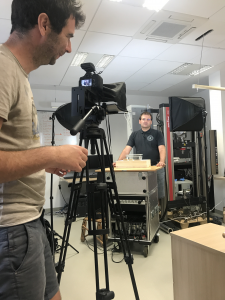
February 12, 2026

Knowledge of science provides young people with skills needed for lifelong learning in a computerized information society. Such knowledge is extremely important for young people to be included in a globalized society and competitive entry into the labour market on equal footing. According to Sadler (Informal reasoning regarding socioscientific issues: A critical reviewof research. Journal of Research in Science Teaching, 41/5, 2004), the inclusion of socio-scientific topics in science lessons provides an answer to the question of how to supply young people with the knowledge to make decisions on important socio-scientific issues, such as genetic technology and climate change.
At the InnoRenew CoE research institute, we decided to contribute to the strengthening of such knowledge by helping to shape the values of sustainable development, such as eco- responsibility and nature protection awareness.
We have designed workshops for various groups of primary school students, which complement the primary school science and technology programs. Even though we had to suspend operations due to the extraordinary circumstances brought about by the COVID-19 pandemic, we found a way to design the program in new conditions by performing activities at a distance.
The project proposal tender for the promotion of wood and woodworking among primary school students from different statistical regions, issued by the Public Agency of the Republic of Slovenia for the Promotion of Entrepreneurship, Internationalization, Foreign Investments and Technology SPIRIT Slovenia, encouraged our institution to consider an online workshop.
We decided to design an interactive online workshop for students from seventh to ninth grade, connected by two facilitators, with the main facilitator being a scientist. Students are encouraged to participate in quiz-like questions provided by a special mobile application. The application provides the answers by students, which are displayed on the screen or linked in graphs. This effectively encourages students’ attention and activity while maintaining contact between the tutor and the students. When students have completed the answers, the correct answer is revealed and is accompanied by a short instructional video with an explanation.

Pupils are encouraged to participate by a quiz provided by the Mentimeter app. On photo: What do wood and sugar have in common? Nothing; Sugar protects wood from fungal infection; Because wood contains sugar, it is attacked by insects. Photo: InnoRenew CoE
Pupils are encouraged to participate by a quiz provided by the Mentimeter app. Question: What do wood and sugar have in common? Answers: Nothing; Sugar protects wood from fungal infection; Because wood contains sugar, it is attacked by insects.) Photo: InnoRenew CoE
The interactive workshop fully preserves the purpose and content of the original. Children learn to distinguish types of wood by basic characteristics and uses, and they also determine the importance of forests for the environment and people from both an ecological and economic point of view. Furthermore, they learn the properties of wood (density, hardness, flexibility, toughness) and their importance to the use of wood and the role of wood products in general.

Presenters Črt (Dr Črtomir Tavzes) and Vesna (MSc Vesna Starman) during the interactive workshop. Photo: InnoRenew CoE
Presenters Črt (Dr Črtomir Tavzes) and Vesna (MSc Vesna Starman) during the interactive workshop. Photo: InnoRenew CoE
Being in direct contact with this type of scientist provides a way to recognize and popularize this scientific profession, and scientific professions in general, and it is one of the purposes of the workshop. As a matter of fact, during the workshop, students are also introduced to some other professions, such as kinesiologist, architect, biologist, chemist and sustainable construction expert, all of whom can be found at a research institute dedicated to wood, renewable materials and sustainable construction like InnoRenew CoE.

Videos are one of the components of the interactive workshop. On the picture: Damjan Muhič (UP) during the recording of one of the videos with Črt, the scientist who explains and also demonstrates individual topics. Photo: Jaka Gašper Pečnik
Videos are one of the components of the interactive workshop. On the picture: Damjan Muhič (UP) during the recording of one of the videos with the scientist Črt, who explains and also demonstrates individual topics. Photo: Jaka Gašper Pečnik
The first responses to the interactive workshop have been extremely encouraging; in the first two months (October and November), as many as ten primary schools from different regions applied for the workshop.Initial concerns, specifically by teachers about the ability of students to participate through the app, were soon proven unnecessary. Not only did the students easily learn the instructions but they also enjoyed this activity the most as they were able to become an active workshop participant.
They also responded with great interest to contact with Črt, the main scientist facilitator. They asked him various questions, from those related to the learning content to completely personal ones—they were interested, for example, in how much a scientist earns, how many hours a week he works and so on.
“Teachers warmly welcome this way of working, as students feel the importance of technology in life and develop a grateful feeling for the natural resources in our forests—wood. The lecture was inspiring for all the listeners. To conclude with the words of one of the students: ‘It was the best lesson of technique.’”
Teacher’s statement about the interactive workshop
Evaluation of the workshops, which included 132 students, showed that most students (83%) were satisfied with the implementation of the workshop; only two percent of students identified themselves as dissatisfied. Most students (79%) also confirmed that they had learned something new, and only five percent felt that they had not learned anything new. Most of them liked the workshop – liked a lot (50%) or quite liked it (39%) – and as many as 74% of students want to continue the workshop. Among the students’ answers to the open-ended question of what they would like to communicate, we found ones such as: “Great to do this and teach students and others and to take care of health and the environment.” These responses indicate that we have achieved at least some of the set objectives.
“As for the workshops, I can say that they were interesting; I also learned something new, because I don’t usually go into such details. If possible, we would cooperate in the future. This would be very interesting for talented students, who come up with some additional ideas.”
Teacher’s statement about the interactive workshop
The interactive workshop was a result of the need to solve problems due to extraordinary circumstances. But, as it turns out, problems can motivate us to step out of the box and find solutions that we might not otherwise come up with. In addition, the design of the online lesson has shown that the participation of experts from different fields can be a great value and an advantage. The importance of interdisciplinarity has been shown in practice in this case, as so many times before.
Vesna Starman,
assistant researcher at InnoRenew CoE
The project was supported by the SPIRIT Slovenia agency and the Ministry of Economic Development and Technology.